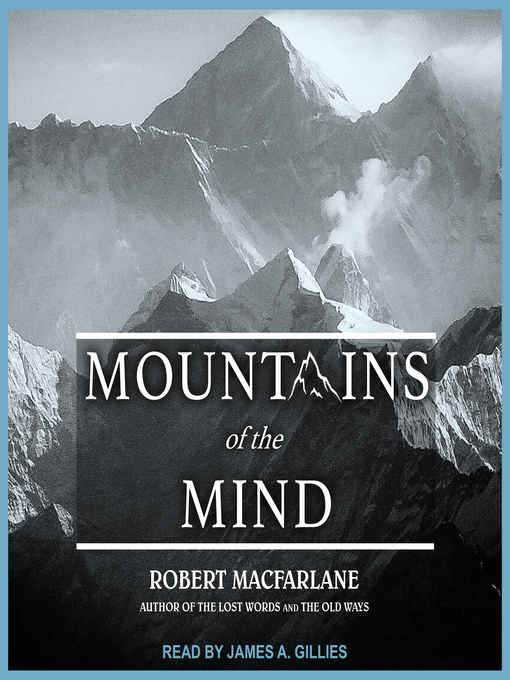Audiobook Review: Mountains of the Mind
I picked this up at the (virtual) library, looking for insights into my own love affair with the mountains. t The title refers to a poem by Gerard Manley Hopkins, a portion of which is quoted in the epigraph.

Title: Mountains of the Mind: Adventures in Reaching the Summit
Author: Robert MacFarlane. Read by James A. Gillies
Publication Info: Tantor Audio, 2019. 9 hours. Originally published 2003 by Pantheon (203 pages)
Source: Library
Publisher's Blurb:
The basis for the new documentary film, Mountain: A Breathtaking Voyage
into the Extreme.
Combining accounts of legendary mountain ascents with vivid descriptions of his own forays into wild, high landscapes, Robert Macfarlane reveals how the mystery of the world's highest places has come to grip the Western imagination-and perennially draws legions of adventurers up the most perilous slopes. His story begins three centuries ago, when mountains were feared as the forbidding abodes of dragons and other mysterious beasts. In the mid-1700s the attentions of both science and poetry sparked a passion for mountains; Jean-Jacques Rousseau and Lord Byron extolled the sublime experiences to be had on high; and by 1924 the death on Mount Everest of an Englishman named George Mallory came to symbolize the heroic ideals of his day. Macfarlane also reflects on fear, risk, and the shattering beauty of ice and snow, the competition and contemplation of the climb, and the strange alternate reality of high altitude, magically enveloping us in the allure of mountains at every level.
My Review:
A great deal may be revealed about this book by tracking the changes in the subtitle through time. When the book was first published in 2003 it was "How Desolate and Forbidding Heights Were Transformed into Experiences of Indomitable Spirit." A serious mouthful, but captures the part of the book that is about how we got from avoiding mountains to seeking them out. The next year it came out in paperback from two different publishers (what the heck?) with two different subtitles: "A History of a Fascination," and the one also on my audio book, "Adventures in Reaching the Summit."
Of all those subtitles, the last is the least to the point. Although the author recounts a number of adventures experienced by himself and others en route to the summit, that's not the point of the book. "A History of a Fascination" is much more on point, because the author, in tracing the transformation of our view of mountains from a place to be avoided to a place to be sought out (even, or especially, at the risk of one's life), reveals the extent to which it is a fascination, or an obsession, for many.
The extremely male early years of mountaineering are covered, and are linked by the author (probably accurately) to a desire for risk, for the adrenaline rush that comes from defying death. I might speculate that it was in some ways a substitute for war, though you'd think there was enough of that around in the 18th and 19th centuries to satisfy anyone.
Gradually that impulse--the one that requires a danger of dying, or at least the ability to imagine such a danger--has for most people faded to a desire for the beauty without death. In the end, that may be the biggest flaw in this book--that the author is trying to document two different things that go on in the mountains: hiking/sightseeing, and mountaineering. The latter, though no longer an all-male pursuit, maintains that original impulse to risk-taking and the addiction to the rush of defying death. I'll stick with hiking trails where I can embrace a bit of discomfort, but have a reasonable expectation of returning, and had hoped for more on that more common modern way of relating to the mountains. There's some more complicated psychology there than is explored in the book.
I want to add a shout-out to the great narration by James A. Gillies. In most cases, the audio narrator is pretty much invisible. When they are not, it is not always a good thing--I've had some books I couldn't finish due to a narrator who drove me mad. In this case, there's a strong presence of Mr. Gillies in the narration, and it is perfect.
My Recommendation:
This is an interesting read, and I can heartily recommend the audio book. If the topic at times ends up feeling a bit less than wholly focused (mostly from switching back and forth between historical climbs and the author's own adventures), it never lacks for interest.



Comments
Post a Comment
Let us know what you think! We love to hear from our readers!